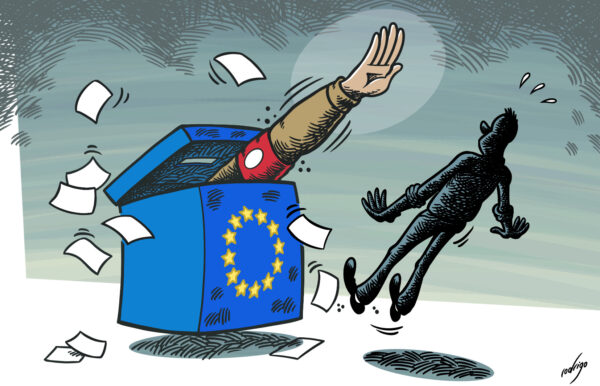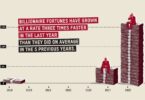The Romanian version of this article can be read here.
Following the EU Parliamentary Elections held from the 6th to the 9th of June, the center-right European People’s Party has gained most seats, prompting Ursula von der Leyen to declare victory.
Conversely, the left, notably the Green Party, has seen a significant decline in support, with considerable gains made by the far right, particularly in major EU countries like Germany and France.
In response to these election results, on June 10th, von der Leyen proclaimed, “Citizens want a Europe that delivers results; starting tomorrow, I will build a broad coalition for a strong Europe. We will unite with others to fortify against extreme factions from both the left and right”.
Similarly, Macron, suffering a momentous defeat, dissolved the National Assembly and called for early elections urging “men and women of goodwill to say ‘no’ to extremes and join together to be able to build a joint project”. He went on to ask for “centrist, progressive, democratic and republican” forces to join together to combat the radicalism found on the right and on the left. The second round of parliamentary elections in France, that took place last Sunday on the 7th of July, however, not only defeated the radical right (RN) but also resulted in a surprising victory for the Left coalition (NFP).
Even though these results are indeed worthy of a moment of celebration, the question remains whether we can hope for the type of changes and reforms representative of socialist or internationalist ideals.
The French National Assembly will now be split into three blocs of comparable size (the Left Coalition, Macron’s coalition, and the far right) with no absolute majority for the Left. Furthermore, the Left parties have united to win against the far right but remain fractured in their ideological disagreements.
Coupled with the legacy of Macron’s “neo-Bonapartist instincts” that show disdain for democratic expressions outside his own victories, and a political climate where the far right’s position is now normalized and secured with numerous far-right Telegram channels calling for mobilization and violence, the Left has to navigate a very volatile political environment. Voters’ tolerance is reduced, and pressures from the far right and centrists are bound to water down the more radical leftist points on the agenda.
Across the pond in the UK, the early elections on the 4th of July resulted in a landslide victory for the Labour Party, ending 15 years of disastrous Tory rule. While this outcome provides some relief, the future remains uncertain. The Labour campaign was vague, making grand promises on fixing social care, the economy, strikes, the NHS, and housing without committing to actual spending. Keir Starmer’s victory owes more to the Tory government’s failures than to Labour’s progressive agenda.
Moreover, Labour has not significantly diverged from Tory policies on immigration and Palestine and has been controversial on trans rights, issues of great concern to left-leaning voters.
Under Starmer, Labour has shifted towards the center, backtracking on pledges regarding immigration, taxing the wealthy, and abolishing tuition fees. Compared to 2019, Labour has lost voter support, with many young people turning towards the Greens and independent candidates. Additionally, the significant number of seats won by the anti-immigrant Reform Party has legitimized xenophobia and racism as political positions, similar to the situation in France.
The losses of the right-wing parties in France and the UK might be an immediate cause for relief in the short term, but we can’t lose sight of what happens next. This year’s losses for the right might be but a prelude to their consolidation for future elections. Their significant share of votes will likely pull leftist forces towards the center and prompt technocratic centrists to form alliances with them on various policies.
For instance, Denmark, despite having a Socialist government, has adopted harsh right-wing policies on immigrants and refugees, demonstrating how center-left parties can embrace far-right stances and big business alliances. This example underscores that if the left and center-left must forsake progressive policies to appease the right-wingers, they’ve already conceded defeat.
Right-wing parties succeed not by winning majorities but by coercing other parties to abandon their principles and ideals, pulling them into a ‘center’ willing to compromise on issues that undermine democracy and violate human rights in order to cling to power.
Political activist and historian Tariq Ali calls such centrist, ‘moderate’ positions as the ‘extreme center’ that subscribe to the ‘horseshoe theory’ and calls anything that opposes the status quo extreme and radical with no deliberation about ideology, politics or ideals.
By bundling together the far right’s fascist impulses and militant nationalism with the radical left’s call for systemic changes encompassing among other things public spending on health and education, and the Green New Deal, this ‘extreme center’ is in fact legitimizing the far right positions. In their paralysis, refusing significant change and conceding politics to economics, the center paves the way for neo-fascists and populist conservatives to seize power.
Thus, it is not surprising that right-wing parties thrive yet again in Europe, and the US faces the potential return of Trump who is now a convicted felon. We should not ask ourselves ‘how can this happen?’ but rather ‘what kind of social and political system is a hotbed for xenophobia, racism, and militant nationalism?’.
***
Looking back in time, particularly the 20th century, there is a mainstream tendency to highlight World War II as an exceptional period in European history. In fact, the memory of WWII, the Allied resistance to Nazism, and the Holocaust have all become pivotal in shaping a common European identity. Fascism, Nazism, and the violence that ravaged the continent are often viewed as historical anomalies—a result of misguided leadership and politics gone amok in the hands of evil politicians such as Hitler. However, fascism is not a political anomaly, but an inevitable monster child of global capitalism1.
Georg Lukacs, a Hungarian Marxist philosopher, in his writings on German fascism pointed out that Germany in the early 30s was succumbing to an aggravating crisis of capitalism2. Before Hitler’s rise to power, Germany was boiling with the anti-capitalist mood and the spirit of a socialist revolution. Fearing the very promising chances of the Communist Party, the Social Democrats who were in power were criticizing the ‘right’ and the ‘left’ as two radicals germinating from the same root.
Umberto Eco similarly points out that the 1930s was a time when fascism was seen as the moderate alternative to the Communist threat3. Fascism’s proposed reforms, springing in Italy first, were extremely attractive to many European liberals in England, Latvia, Estonia, Lithuania, Poland, Hungary, Romania, Bulgaria, Greece, Yugoslavia, Spain, Portugal, Norway, not to mention Germany.
The fascist movements that sprung across Europe in the last century were incredibly versatile, driven by a certain emotional appeal rather than a clear ideology. If you remove the imperialist aspect from classical Italian fascism, you get something like Salazar’s Portugal; remove the colonial dimension and you get Balkan fascism. Add to Italian fascism a little radical anti-capitalism and you get something similar to the thinking of Ezra Pound – an American poet supporting Mussolini. Historian Jacob Mikanowksi writes that fascism in interwar Eastern Europe in particular was a ‘movement of desperate people in search of a transcendent cause, who gave no thought to what that cause should be4‘.
As Umberto Eco emphasizes, fascism is not a singular entity defined by the image of an authoritarian, militant leader who charms society into violent hypnosis through charisma and coercion—fascism can take many forms. That’s in fact its essence. Many totalitarian varieties are referred to as fascism precisely because it wasn’t a monolithic ideology, but a synecdoche, a set of different political and philosophical ideas that had different configurations around the world.
In other words, the different faces of fascism emerged as a monstrosity encompassing many frustrations of the society. These frustrations, continuing and deepening under global capitalism, are bound to produce new reactionary movements like the ones we are witnessing today.
Historian and scholar Enzo Traverso proposes the term ‘postfascism5‘ to describe contemporary far right impulses towards xenophobia, racism, misogyny, and authoritarianism. It has its roots in classical fascism, but has metamorphosed into something completely different, taking distinct forms around the world. It certainly doesn’t resemble the totalitarian terror of the last century, but it is as dangerous because it is versatile and likes to employ liberal and democratic language to defend its position as in the case of Marie Le Pen who “aims to combat Islamist ideologies, which are incompatible with [French] values, [French] history and [French] culture, and which stem from a totalitarian vision of social life6”.
There are thus more layers of complexity in contemporary fascist cries with a separation between economic issues and social/moral beliefs that makes the left-right political spectrum ever more convoluted.
The equation of free markets with freedom and ‘Western values’ gives rise to populist right wing leaders like Viktor Orban who advocates for chauvinist politics and xenophobia, pointing to Western Europe as a degraded moral space that has let Europe down by abandoning Christiniaty, conservative values and allowing immigrants and refugees in. These sentiments have driven political elites in Hungary, but also Poland and Slovakia to rebrand themselves as the ‘better Europe’ – devoid of the sins of imperialism and colonialism of Western Europe and promoting the ‘true, white Christian Europe7‘.
In Germany, the neo-Nazi party, the AfD has started out as a anti-establishment and anti-euro party and since 2015 has similarly turned to strong anti-immigration, anti-Muslim positions, advocating for “Our country first!”. One of the participants at the AfD rally asked: “What do you think as a German, if you need an apartment and then hear, there would be an apartment free but that is kept free for Ukrainians? Then I say to myself, thank you, Germany. I pay taxes but I don’t get an apartment.”.
The incapacity of so-called moderate, centrist politics to address the crises of capitalism, especially the profound impact of the 2008 financial crisis, has exacerbated unemployment, rewarded financiers and bankers, and imposed austerity on society at large.
This separation of political and economic spheres with the submission of the former to the latter has given rise to new forms of ‘anti-politics’ where pragmatic managers, not bearers of ideals, are winning elections. Thus, legitimate frustrations about inequality, stagnant wages, and cuts to public spending have created a void in politics easily filled by fascist narratives pointing to ‘recognizable enemies’ and offering easy solutions like Brexit, anti-immigration rhetoric, and withdrawal from the EU.
In a 2021 article for the Tribune, writer Grace Blakely, pointed out that “the trouble with the liberal view is that democratic institutions don’t float atop society — they both shape and are shaped by social relations. When the gaps in experience between different groups become too large, some groups will naturally come to feel — often correctly — that their interests are not being represented.”
Indeed, The European Union today is not really the idea it claimed to be just a few decades ago: an idea of a peaceful, prosperous, international community based on cooperation, unity, human rights, free movement of goods, ideas and people.
Today, the EU is governed not by democracy, but by technocrats of ‘the troika’ (the European Commission, the European Central Bank, and the International Monetary Fund) that have established a financial dictatorship: they fix the rules, they force the member states to apply them and then control their application.
The politicians of the EU in fact can only ensure their political survival and advance their political careers only if they submit to financial interests and dedicate their political careers to the support of an efficient operation of the market. And financial capitalism is a beast that requires stability and moderation: the left wants to reform it to restore democracy while the right succumbs to reactionary proposals.
It is the center that promises ‘normality’, and ‘stability’ even if that entails exploitation, inequality, injustice and violence against minorities and the marginalized. Liberals and social democrats alike have long abandoned their ideals and political philosophies, and instead have morphed into an ideological appendage of the status quo. This ‘radical center’ is the means by which conflict is suppressed but not assuaged, and contradictions subdued but not resolved. They employ the terms ‘fascist’ and ‘populist’ to describe opponents on the left and on the right.
Enzo Traverso for instance writes that the term ‘populist’ has been used so many times to describe so many politicians that it has no meaning anymore. It is simply a derogatory term to describe one’s political opponents.
He further points to mainstream liberal newspapers like the New York Times, the Economist, Le Monde, or the Guardian that indiscriminately use the term ‘populism’ to encompass both social policies such as resistance to austerity, advocating for minimum wage increases, and expanding public service expenditures, as well as politics rooted in xenophobia and racism.
This careless and casual usage of the term blurs distinctions between left and right policies, undermining a clear compass for understanding and engaging in politics.
Grace Blakely writes that the center persuades people that it can be ignored. Faced with the disaster of Boris Johnson and Trumpism, it does not promise to make things better, only to prevent them from getting worse. This uninspiring stance not only fails to address societal challenges but also erodes public trust and exacerbates democratic decline—a perilous trend with historical parallels. In the current political landscape, it is crucial to observe how the Labour Party in the UK and the left-wing coalition in France will navigate their strategies on the political stage.
Particularly in France, the question arises whether they will advance a progressive agenda or be drawn towards a pragmatic “center,” where far-right concerns may seek to enforce racist and anti-immigration policies under the guise of ‘national interests’.
Sociologist Dylan Riley underscores that 1930s classical fascists didn’t oppose liberalism for its democratic principles but because they perceived them as being utterly undemocratic and inadequate in representing the interests of ‘the nation’.
Fascists argue that politics stands in the way of national interests, implying that a national interest can and does exist without being shaped through political processes: ‘fascism is a denial of politics’. This reality echoes alarmingly in our times.
The rise of technocratic governance in the EU and national governments, which pressures politicians to prioritize short-term electoral gains and facilitate free movement of financial capital while restricting the movement of people, has resulted in an assault on democracy. Democratic institutions are losing their legitimacy in the eyes of the people. People don’t trust in politics and the political process because they feel they have no power to influence anything.
This phenomenon of political fatigue, if not outright contempt for the political process, is not solely a problem of Western countries. In our region, fascist forces are consolidating their positions. Alongside the “usual suspects” such as Orban and his Fidesz party in Hungary, PiS in Poland, and ĽSNS in Slovakia, we also have the AUR Party (Alliance for Romanian Unity) in the Romanian Parliament since 2020.
Popovici and Marincea (2022) underscore that AUR managed to enter parliament primarily due to the so-called “soft right” group, which includes crypto-fascists, conservatives, patriots, and various right-wing intellectuals. They wield significant influence in the mainstream, presenting themselves as liberals while supporting extreme right-wing ideas. Dominant parties like PSD (Social Democratic Party) and PNL (National Liberal Party) also contribute to the rise of the right by normalizing nationalist and xenophobic discourses. Similar to the situation in France, the UK, Germany, and Italy, disillusionment with the global liberal order, which favors capitalist and financial interests and imposes austerity on the rest, facilitates in Romania, the ascent of neo-fascist parties like AUR, who exploit these grievances for electoral gain.
In my view, the tragedy in our region lies in the persistent marginalization of radical and progressive anarchist or left ideas, perpetuated by deep-seated mistrust and suspicion rooted in associations with Soviet-style communism or an ambiguous “pro-Russian” stance. The pervasive anti-communist rhetoric dominates every facet of life, rendering it seemingly unquestionable. This makes it exceedingly challenging for left-leaning voices in Eastern Europe and the post-Soviet space to introduce a new progressive agenda without being misconstrued as Russian propaganda or nostalgia for Soviet times. In such a climate, parties like AUR capitalize on severe socio-economic crises and frustrations to entice support with neo-fascist promises.
***
Returning to the insights of philosopher György Lukács from a century ago, criticizing fascism without addressing capitalism is akin to standing on the same ground as fascism.
Any attempt to combat fascism without confronting its roots risks unwittingly adopting half or three-quarters of fascist assumptions: “one cannot fight fascism in mere form; it must hit and overthrow the content together with the form, and capitalist exploitation together with the fascist form”.
Capitalism, an inherently unstable system perpetuating inequalities and exploitation, inevitably faces recurring crises. When democratic politics falters under the dominion of capitalism’s relentless pursuit of accumulation, an apolitical void emerges, swiftly filled by fascists peddling simplistic solutions: militant ethno-nationalism, xenophobia, and authoritarianism.
Unfortunately, history has shown that fighting fascism while harboring partial fascist assumptions is tantamount to endorsing the fatalistic theory of the lesser evil. If today’s centrists manage to thwart the extreme right without fundamentally addressing the crises precipitated by financialization, unaffordable housing, stagnant wages, and cuts to essential services, we risk only delaying the resurgence of fascist impulses.
The ‘radical center’ has effectively leveraged the specter of fascism as a political scarecrow, yet merely critiquing fascism in form, not in substance, achieves little beyond short-term electoral gains. It’s deeply concerning that public interest in politics is waning, and that the pursuit of power through electoral manipulation eclipses genuine political discourse on ideas and ideals. This erosion of principled politics has not only normalized but also emboldened extreme right-wing agendas and rhetoric.
Despite not commanding an outright majority, far right parties in countries like France, the UK, Germany, and our own region enjoy substantial popularity and will continue to advance their fascist agendas. In our current political landscape, we confront a recurring dilemma echoing through history: do we engage with progressive ideas proposing significant reforms and revive politics from technocracy to authentic discourse, or do we yield to the allure of fascist-like violence and reactionary chaos?
REFERENCES:
- Rodney, W. (2018). How Europe underdeveloped Africa (New edition). Verso. ↩︎
- Lukács, G. (1933). How did fascist philosophy come about in Germany? 1933. Marxists Internet Archive Library https://www.marxists.org/archive/lukacs/works/fascism/foreword.htm
↩︎ - Eco, U. (2020). How to Spot a Fascist. Harvill Secker. ↩︎
- Mikanowski, J. (2023). Goodbye, Eastern Europe: An intimate history of a divided land (First edition). Pantheon Books. ↩︎
- Traverso, E., & Broder, D. (2019). The new faces of fascism: Populism and the far right translated by David Broder (English-language edition). Verso. ↩︎
- https://www.thelocal.fr/20240611/what-would-a-victory-for-le-pens-party-mean-for-france ↩︎
- Rexhepi, P. (2023). White enclosures: Racial capitalism and coloniality along the Balkan route. Duke University Press. ↩︎
Background image: https://www.cartooningforpeace.org/en/editos/the-far-right-conquers-europe/










[…] Versiunea în limba engleză a articolului poate fi citită aici. […]